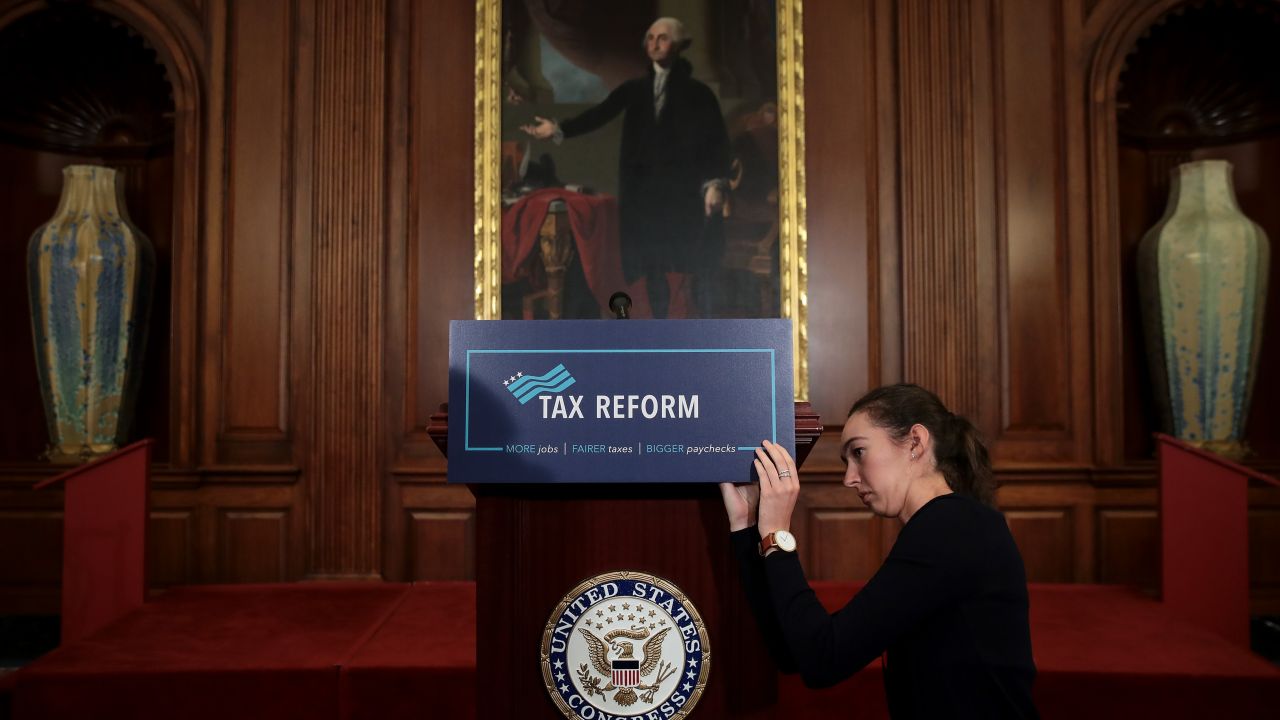
A staff member sets the stage before a news conference where Republican lawmakers announced their plans for tax reform on Sept. 27, 2017 in Washington, DC. (Photo by Drew Angerer/Getty Images)
This Q&A is part of Sarah Jaffe’s series Interviews for Resistance, in which she speaks with organizers, troublemakers and thinkers who are doing the hard work of fighting back against America’s corporate and political powers. This interview has been edited for length and clarity.
He’s been promising it since the campaign trail — and now, finally, President Trump has released a tax plan. Sarah Jaffe got perspective from Marshall Steinbaum, research director and fellow at the Roosevelt Institute.
Sarah Jaffe: We are going to talk about Trump’s tax plan. Give us a rundown on what is in it and what it would do.
Marshall Steinbaum: The basic thrust of the proposal is more of the same right-wing tax policy that we have been seeing play out over the last 40 years. I would say it’s a supercharged version of that. They have sloughed off a few of the elements that weren’t core to previous proposals — like some tax cuts for middle-income people. Instead, they have just gone full-bore straight toward huge tax cuts for people who rely on their wealth to make their living.
SJ: How does the tax system work for people who are wealthy and essentially living off of their capital?
MS: Capital is an economic concept, and it is a somewhat abstract and also imprecise one. There is a robust debate about whether people who live off of their capital income are deriving the benefits of productive investment or are they basically leeching off of the rest of the economy. There is no one correct answer.
What we don’t do in US is to just look at the total amount of wealth that people own and tax some percentage of that big pile. Instead, we tax various forms of capital income. The main ways that we have done that taxing the profits of corporations through corporate income tax or corporate profits tax. Secondly, we tax the capital gains. Basically, if the value of your capital goes up, we tax some percentage of the increment of the wealth increase. Taxing inheritance — estate taxes — that would also be considered a tax on capital. As part of the individual tax system we also tax dividends — a dividend is an annual or quarterly payment that a company makes to a shareholder.
— Marshall Steinbaum
A single-minded policy of cutting taxes on all forms of capital is really the central thrust of this tax plan.
SJ: They seem to have dropped all pretense that there was going to be anything for working people in this tax plan. Is that the way you see it?
MS: I should say that that is my interpretation of their plan. They would give you a very different account of what, for instance, cutting effective tax rates on corporations would do. They maintain if you cut corporate taxes, you are actually increasing wages.
This gives them the talking point: “This tax cut is not going to worsen inequality, because workers will benefit,” even though in reality, it will. There is no provision of the tax legislation that is going to say, “Well, if it does turn out that this does worsen inequality, then these tax cuts are retracted.”
They are probably going to say that the tax cut won’t increase the deficit or will do so in a small way because by unleashing economic growth, it will cause federal revenues to increase. All of this is, again, part of the rhetorical weaponry that they need to assemble in order to get the votes they need to get the thing over the finish line.
SJ: I want to talk a little bit about chained CPI, which may be returning in this proposal. Can you explain to people what that is?
MS: Chained CPI is an element of the idea that we needed to both cut government spending over the long-term because entitlement programs were growing too quickly.
Social Security is supposed to be basically wage insurance for after you retire. So, after you are not working, you should still get some labor income — you are deferring labor income from your working life to your retirement. The way Social Security is currently “indexed to inflation” is that as earnings increase on average over time, Social Security benefits increase over time. Chained CPI, on the other hand, is saying, “Instead of indexing the cost-of-living increases to changes in earnings, we will index them to changes in the cost of consumption” and, in general, that is less than earnings inflation.
SJ: Trump ran on the notion that he was different from regular Republicans. Has actually done anything that your Mitch McConnell or Paul Ryan Republican wouldn’t have done?
MS: There is no gap whatsoever on economic issues between Donald Trump, Mitch McConnell and Paul Ryan.
— Marshall Steinbaum
Even on trade, which was the place rhetorically where he got furthest away from Republican orthodoxy, the so-called promise to renegotiate NAFTA has just become a promise to take all of the pro-corporate provisions that were in the cancelled TPP and shove them into NAFTA. It is the exact opposite of what he ostensibly promised on the campaign trail.
SJ: On that front, what are the best arguments, if people are doing a full-court campaign against these tax proposals? What is the best way to rally the opposition to this?
MS: If all you want to do is block this proposal, all that matters is rallying the same few Senate votes that were rallied on health care to block it. What you have to do is hammer home that, especially under the Obama administration, Republicans have been saying the federal debt was a big problem. Find the red lines that these senators have put forward in their past statements and on the campaign train in the past, stack their town meetings with people saying, “Why are you going back on your promise to not increase the deficit?”
I don’t think that alone is a sufficient strategy and it worries me a bit that the opposition will take too much of a laser focus and miss the larger significance of this debate. We need to have a conversation about how the economy works and specifically about the role of tax policy and especially progressive tax policy in structuring how the economy works.
Wage stagnation really is a great threat for the long term and therefore it is time to shift the focus of what is wrong with the economy to, “Why are people underemployed? Why are wages stagnant? Why have normal people not been able to enjoy the benefits of the economic recovery that have gone almost exclusively to the top?
We have eliminated progressive taxation in this country or vastly reduced it, and the effect of that has been to increase the incentives that rich people and powerful people have to dominate the economy to their own benefit. We used to have a statutory maximum individual income tax rate of 90 percent over a very high income — basically making it disadvantageous to be rich.
There were no rich people by today’s standards in 1960. Now we have many of them and they are richer than they ever were before. That is because we stopped taxing them so it became more worthwhile to earn more. If you are wondering why the owners of one gigantic profitable corporation would want to merge with another gigantic profitable corporation and cut tens of thousands of workers, chop off their supply chain and raise prices to consumers, that is exactly why. If their tax rates were still 90 percent there would be no incentive to do that.
SJ: How can people keep up with you and your ongoing work on the subject?
MS: I tweet quite a bit. I am @Econ_Marshall if you want to follow me on Twitter. I also write a lot both for the Roosevelt Institute, its website and other locations. I look forward to hearing from people.
Editor’s Note: You can read any number of favorable and critical analyses online:
- An Analysis of Donald Trump’s Revised Tax Plan (Tax Policy Center)
- “Even GOP hard-liners don’t believe in Trump’s tax plan” (The Washington Post)
- “How Does the Trump Tax Plan Affect You? WSJ Answers Your Questions” (The Wall Street Journal)
- “Warren Buffett and Larry Fink criticize Trump’s tax plan” (CNBC.com)
- “Trump’s tax reform plan: Who are the winners and losers” (Fox News)
- “Poll: 48 percent approve of Trump’s tax proposal” (Politico)
- “Trump’s Tax Plan: The Good, The Bad And The Ugly” (Forbes)
Interviews for Resistance is a project of Sarah Jaffe, with assistance from Laura Feuillebois and support from the Nation Institute. It is also available as a podcast on iTunes. Not to be reprinted without permission.




